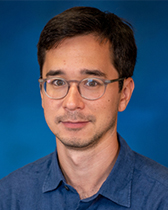
Alumni Spotlight: Paul Ohno
Paul Ohno was a graduate student in the Geiger Group and is now an Assistant Professor at Auburn University. The Ohno lab seeks to combine cutting-edge linear and nonlinear spectroscopies with traditional aerosol analytical techniques to determine key chemical and physical properties of aerosol particles and liquid interfaces.
You attended Northwestern from 2014-2019. How did your time in the Department shape you and inspire your current work as a professor?
I did not appreciate at the time how fortunate I was to be surrounded by so many eminent scientists (for instance on my committee!) at a place where people do ambitious science, but also (in my experience) treat each other with respect and work collaboratively when the situation arises. That is a powerful combination and something I hope to replicate in my own work in some small way.
How would you explain your area of research to non-scientists? What drew you to this line of research?
We use lasers to study the surfaces of a variety of materials, including liquids and droplets. Surface science is fascinating because on the one hand, everyone knows what the word “surface” means, and yet when I first heard the term "surface science" I had absolutely no idea what it meant. When someone explained it to me (“Imagine hypothetically zooming in closer and closer to the surface of a material. At some point, you reach the length scale of individual atoms and molecules. What are the properties and reactivities of those atoms and molecules on that very top layer of the material?”), it seemed so obvious and yet was something I had never remotely thought about before. That was December 3, 2012, the day my eventual undergraduate research advisor (Prof. Steven Bernasek at Princeton University) presented his research to my undergraduate class. I've been hooked ever since.
You did research in Franz Geiger’s group while at NU. Can you tell us a memorable part of that experience?
Franz did an incredible job leading a group culture where it really felt like a team, with everyone working together. My best memories are working with all my incredible former colleagues and, in particular, celebrating each other's successes following qualifying exams, published papers, defenses, etc. (and, on the flip side, supporting each other when things weren’t perfect). That cohesiveness is a rare thing and something I hope to be able to emulate with my own research group. Franz himself has an unbridled enthusiasm for science that is truly unmatched by anyone else I have ever met, which is something else that I find inspiring.
Is there any advice you could give current Department students?
Everyone is different and has their own way of working. One thing that I did during my time at NU (and try to do still, though I don't often have enough time) was to read both broadly and deeply, older papers and new. There are always experiments to be run in the lab, but it is also valuable to take the time to really understand the history of how your field got to the point that it did, and what directions it’s headed from there, to help you plan the most productive lines of inquiry. Of course, there is always a balance as you could also get sucked into spending all your time reading and planning the perfect experiment, and for years to pass by before you ever actually try anything!
What is a hobby or activity you do outside of teaching Chemistry?
I play tennis with my wife Isabel and many others here in Auburn, where we have a beautiful yet lightly used public facility with 16 clay courts- an absolute gem in this country.
Where do you hope to be in your career in the next 10 years?
I hope to lead a research group here at Auburn that has a track record of doing interesting science and of producing PhD students who have both learned a lot and who feel prepared for whatever next steps they desire to take.
